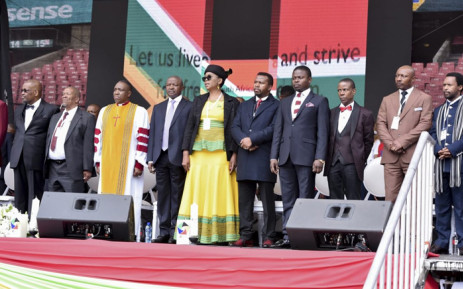
Calling on divine intervention: Sunday to mark Day of Prayer against COVID-19
The president said as South Africa moved to level 3 lockdown, we needed all the help we could get and that included divine intervention.
by Sifiso ZuluJOHANNESBURG - President Cyril Ramaphosa on Tuesday evening said this Sunday would be a National Day of Prayer against the coronavirus pandemic.
Ramaphosa said the lockdown had robbed millions of South Africans of their right to attend their various services.
But government said a National Day of Prayer was needed as the country moved forward to level 3 lockdown.
The president said that services could start again next month, but with certain conditions including social distancing, sanitising, and no more than 50 people.
WATCH: Ramaphosa: Places of worship may reopen under strict conditions
He said as South Africa moved to level 3 lockdown, we needed all the help we could get and that included divine intervention.
“I, therefore, urge all South Africans to heed the call of the leaders of our various faith communities for a National Day of Prayer on Sunday, the 31st of May, when we will once again come together to pray for the healing of our land and the protection of our people,” the president said.
Ramaphosa said religious leaders across the country would lead the people in prayer on Sunday.
“On this day, wherever we may be, I call upon you to turn your thoughts to all who have been affected by this pandemic. On this day, we should remember those who are working to keep us safe, those who are suffering and grieving,” Ramaphosa said.
“Whether you are a person of faith or not, there is one belief that unites us, and that is our belief in South Africa, in its people, in their courage and in their ability to overcome even the greatest of tribulations,” he added.
He said prayer could not work alone as people were still expected to protect themselves so that infections did not increase rapidly.
CONCERNS OVER CLUSTER INFECTIONS
The Jesuit Institute South Africa questioned the decision by government.
“This has been very quick to suddenly make this change. I question why the sudden rushed move because evidence of cluster infections in other parts of the world suggests that even in places of worship where strict social distancing was upheld, there were reports of infection,” said the institute’s Father Russell Pollitt.
Pollit was concerned about how places of worship would adhere to social distancing.
“Who gets to attend and who doesn’t? and who decides who attends? Are the police going to monitor churches?” he asked.
He also questioned how poorer places of worship were going to be able to afford personal protective equipment and cleaning supplies.
For official information about COVID-19 from the Department of Health, please click here.